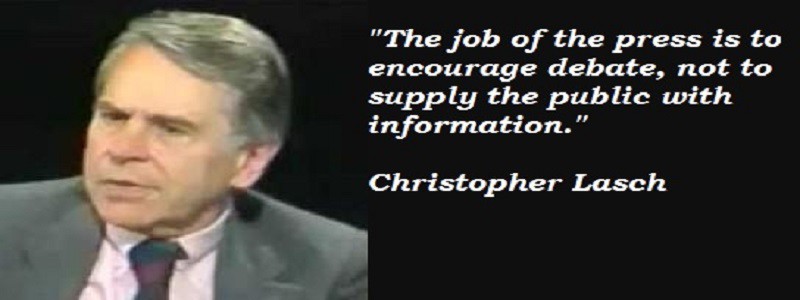
“But My Students Don’t Know Enough Yet to Engage in Debates!” Christopher Lasch on the Argument vs. Information Confusion
By Gerald Graff
“Hey, I’m all for teaching argument and debate,” my colleague assured me after viewing the ACE website. “But students have to know something about a topic before they can usefully debate it, and students these days just don’t.”
It’s one of the most familiar objections to organizing school and college curricula around debatable issues: until students know enough of the relevant information—as today’s students rarely do—they aren’t ready to debate such issues. And it’s certainly true up to a point: it’s hard to enter a debate about whether income inequality is a problem or not if you lack information about what’s been happening to income distribution over the last generation.
What this way of thinking ignores, however, is its circularity: yes, students need some economic knowledge to intelligibly debate the pros and cons of income inequality, but unless they are exposed to the debate they may not see the point of acquiring that data in the first place.
This argument was best and most succinctly made by my late friend and former colleague Christopher Lasch In a brilliant 1990 essay entitled “The Lost Art of Political Argument.” Lasch’s concern was with the decline of citizen engagement in our democracy rather than with student learning problems, but his remarks suggest why educators who assume that knowledge of information must always come before debate often have things backwards:
Let us begin with a simple proposition. What democracy requires is public debate, not information. Of course it needs information too, but the kind of information it needs can be generated only by vigorous popular debate. We do not know what we need to know until we ask the right questions, and we can identify the right questions only by subjecting our own ideas about the world to the test of public controversy. Information, usually seen as the precondition of debate, is better understood as its by-product. When we get into arguments that focus and fully engage our attention, we become avid seekers of relevant information. Otherwise we take in information passively—if we take it in at all.
In other words, we comprehend and retain information when it is relevant to arguments “that focus and fully engage our attention” and thus give information cognitive traction. When no such arguments are at hand, we quickly forget most of the stuff that comes at us.
Lasch continues:
From these considerations it follows that the job of the press is to encourage debate, not to supply the public with information. But as things now stand, the press generates information in abundance, and nobody pays any attention. It is no secret that the public knows less about public affairs than it used to know. Millions of Americans cannot begin to tell you what is in the Bill of Rights, what Congress does, what the Constitution says about the powers of the presidency, how the party system emerged or how it operates. Ignorance of public affairs is commonly attributed to the failure of the public schools, and only secondarily to the failure of the press to inform. But since the public no longer participates in debates on national issues, it has no reason to be better informed. When debate becomes a lost art, information makes no impression.
If you rewrite Lasch’s sentence as, “Since students are not exposed to the debates on the subjects we want to them to know about, they have no reason to be better informed,” you have a pretty good rationale for argument-centered education.
Christopher Lasch, “Journalism, Publicity, and the Lost Art of Political Argument,” Gannet Center Journal (Spring 1990): 1-11; excerpted in Harper’s Magazine (Sept. 1990): 17-22; see my further elaboration on Lasch’s comments in “President’s Column: Argument over Information,” MLA Newsletter, 40.3 (Fall 2008): 3-4.


Trackbacks for this post